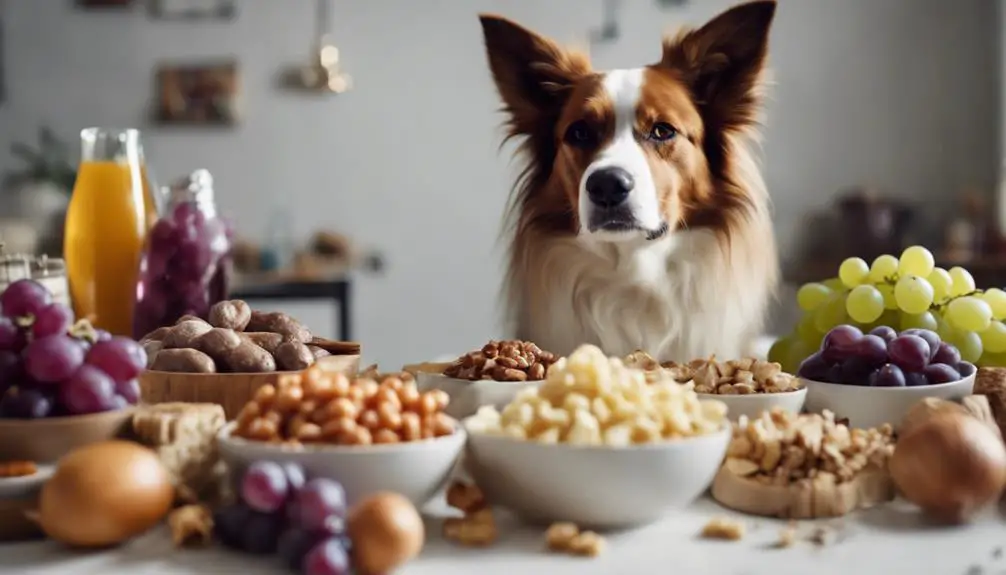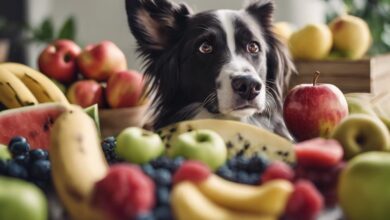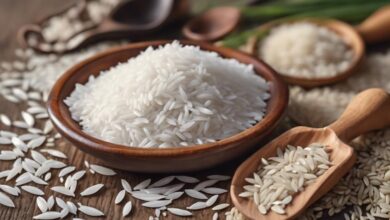What Are Foods Dogs Can Not Eat
Be mindful of foods dogs cannot eat to safeguard their health. Chocolate contains theobromine and caffeine, causing vomiting, restlessness, or worse. Grapes and raisins lead to kidney failure. Xylitol triggers hypoglycemia and liver damage. Onions and garlic affect red blood cells. Avocado contains persin, potentially harming dogs. Alcohol can poison them due to their sensitivity. Caffeine makes them restless and can lead to seizures. Stay vigilant to avoid harming your furry friend. Further knowledge awaits on ensuring a safe diet for your beloved pet.
Key Takeaways
- Chocolate contains theobromine and caffeine, toxic to dogs, leading to vomiting, diarrhea, seizures, and death.
- Grapes and raisins can cause kidney failure in dogs, keep them away.
- Xylitol causes hypoglycemia and liver damage in dogs, avoid products with xylitol.
- Onions and garlic damage red blood cells in dogs, use alternatives like leeks or chives.
- Avocados contain persin, harmful to dogs causing vomiting, diarrhea, and breathing difficulties.
Chocolate

Chocolate is one of the most well-known foods that dogs can't eat due to its toxic effects on their health. Cocoa toxicity in chocolate contains theobromine and caffeine, which are harmful to dogs. Even small amounts can cause symptoms like vomiting, diarrhea, restlessness, increased heart rate, and in severe cases, seizures and death. It's important to keep all chocolate products, including cocoa powder, away from your furry friends. When baking with dogs around, be cautious and make sure they don't ingest any chocolate or cocoa-containing items. Remember, chocolate should never be given as a treat to dogs. If you suspect your dog has ingested chocolate, contact your veterinarian immediately for guidance on how to proceed.
Grapes and Raisins
Grapes and raisins are highly toxic to dogs and should never be consumed by them due to the serious health risks they pose. Even small amounts can lead to kidney failure in dogs. It's important to keep these fruits away from your furry friend at all times. Now, moving on to other fruits, dogs can eat apples in moderation as they are a good source of vitamins A and C. Be sure to remove the seeds and core before offering them to your pet. Bananas are safe for dogs to eat as well, providing essential nutrients like potassium and fiber. Just remember to feed bananas in moderation due to their high sugar content to prevent any digestive issues.
Xylitol
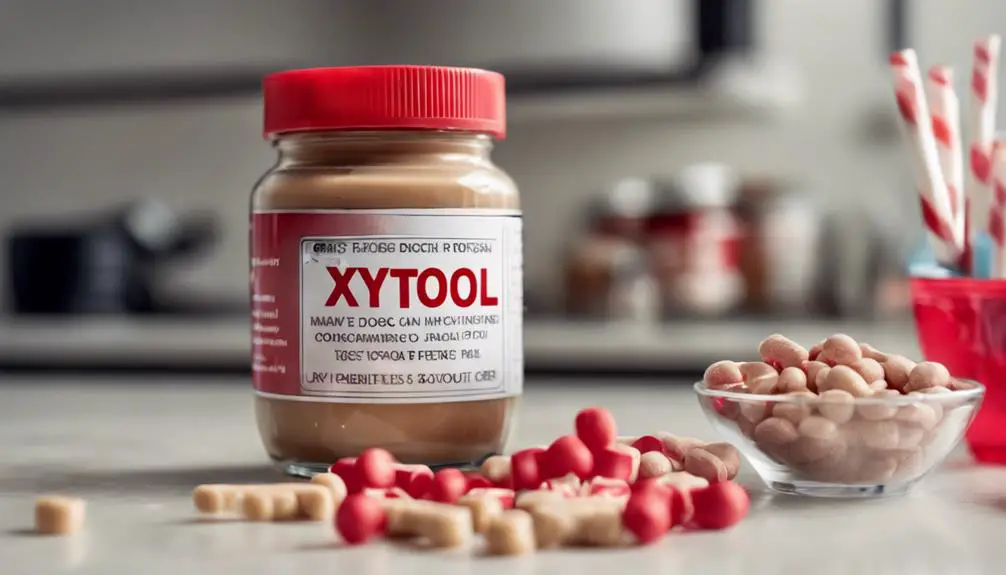
Xylitol is an important sugar substitute found in many products, including sugar-free gum and some peanut butter brands, that can be extremely toxic to dogs. Here are some dangers associated with xylitol ingestion:
- Hypoglycemia: Xylitol can cause a rapid release of insulin in dogs, leading to dangerously low blood sugar levels.
- Liver Damage: Ingesting xylitol can also result in liver failure in dogs, which can be life-threatening.
- Seizures and Potential Death: In severe cases, xylitol poisoning can lead to seizures and even death in dogs.
It is essential to avoid feeding your dog products that contain xylitol. Consider using alternative sweeteners like stevia or honey, but always consult your veterinarian before introducing new foods to your pet.
Onions and Garlic
Onions and garlic are common household ingredients that can pose significant health risks to dogs if ingested. Both onions and garlic contain compounds that can cause damage to a dog's red blood cells, leading to symptoms like weakness, vomiting, and breathing difficulties. Here is a table outlining the health risks and cooking alternatives related to onions and garlic:
| Health Risks | Cooking Alternatives |
|---|---|
| Damage red blood cells | Use alternatives like leeks or chives |
| Weakness | Avoid using onion or garlic powder |
| Vomiting | Cook with herbs like parsley or basil |
| Breathing difficulties | Check labels for hidden onion or garlic ingredients |
Remember to always consult your vet if your dog accidentally consumes onions or garlic to safeguard their safety.
Avocado
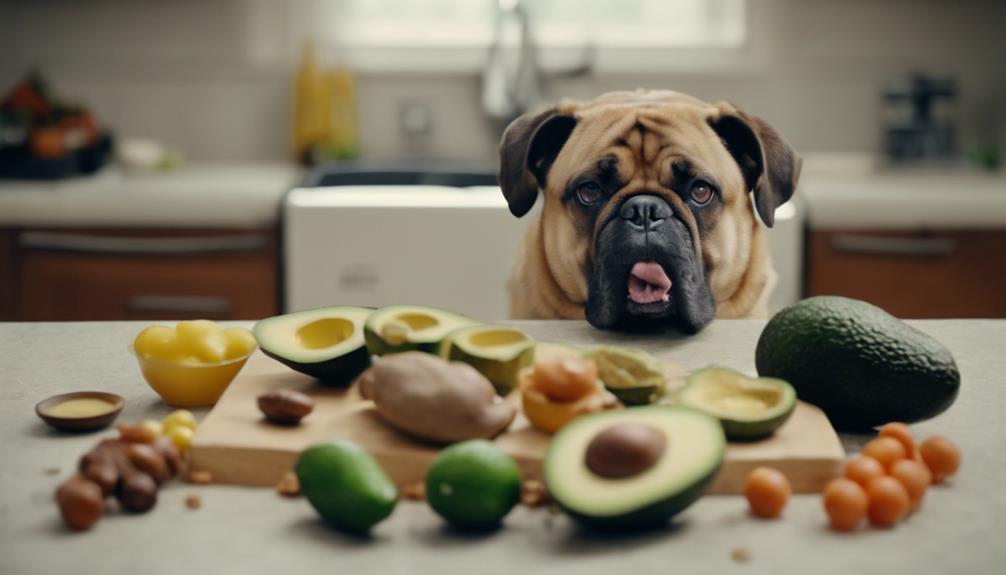
Avocados are toxic to dogs, containing a substance called persin that can cause mild to severe health issues. Symptoms of avocado poisoning in dogs include vomiting, diarrhea, and difficulty breathing. It's important to keep avocados away from your canine companion to prevent any potential harm.
Toxicity of Avocado
Avocado can be toxic to dogs due to a substance called persin found in the fruit. When it comes to avocados and your furry friend, remember the following:
- Avocado Seed: The pit or seed of an avocado contains a higher concentration of persin, making it even more dangerous for dogs.
- Avocado Skin: While the flesh of an avocado contains less persin, the skin still poses a risk if ingested by your canine companion.
- Symptoms: Keep an eye out for symptoms like vomiting, diarrhea, lack of energy, and difficulty breathing, as these could indicate avocado poisoning in your dog.
Be cautious and avoid feeding your dog avocados to prevent any potential toxicity issues.
Symptoms of Poisoning
If your dog has ingested avocado and is experiencing symptoms of poisoning, immediate veterinary attention is vital to guarantee proper treatment and care. Symptoms of avocado poisoning in dogs may include vomiting and diarrhea, which can lead to dehydration if not addressed promptly. Additionally, your dog may exhibit signs of lethargy and weakness, indicating potential toxicity from the avocado consumption. It's important to inform your veterinarian about the avocado ingestion and the onset of symptoms to aid in the diagnosis and treatment process. Timely intervention can help your dog recover more effectively and prevent any further complications associated with avocado toxicity. Always prioritize your dog's health and well-being by seeking professional veterinary assistance when necessary.
Alcohol
Alcohol should never be given to dogs as it can be extremely harmful to their health. When ingested, alcohol can have severe effects on dogs, leading to alcohol poisoning, which can be life-threatening. Here are three reasons why alcohol should be kept far away from your furry friend:
- Toxicity: Dogs are much more sensitive to alcohol than humans, making even small amounts dangerous for them.
- Symptoms: Alcohol can cause a range of symptoms in dogs, including vomiting, diarrhea, difficulty breathing, coordination problems, and even coma.
- Treatment: If you suspect your dog has ingested alcohol, seek immediate veterinary care. Treatment may involve supportive care to help your dog recover from alcohol poisoning.
Caffeine

When it comes to your furry friend's health, it's important to be mindful of the dangers of caffeine consumption for dogs. Dogs are highly sensitive to caffeine, making it vital to keep them away from products like coffee and energy drinks. Caffeine can lead to various health issues in dogs, including restlessness, rapid breathing, heart palpitations, muscle tremors, and even seizures. To guarantee your pup stays healthy and safe, it's essential to avoid exposing them to any caffeinated products. Here's a table summarizing some common sources of caffeine that should be kept away from dogs:
| Caffeine Sources | Potential Risks for Dogs |
|---|---|
| Coffee | Restlessness, Seizures |
| Energy Drinks | Rapid Breathing, Tremors |

If Richie Bedard is a dog food expert, author, or any other figure in the field of dog nutrition that emerged after September 2021,
